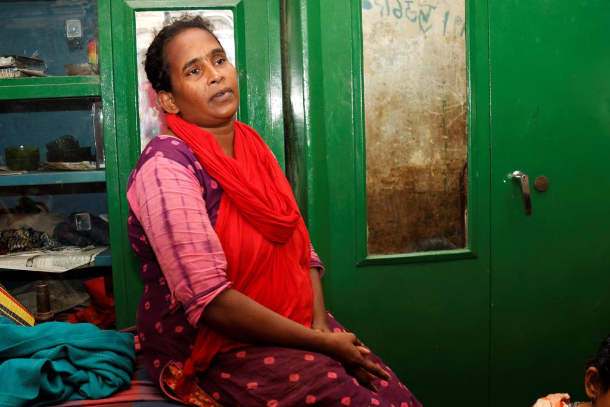
Stephan Uttom and Rock Ronald Rozario, Dhaka, Bangladesh
September 19, 2019
Fahima Begum looks much older than her 30 years with her tired, pale face and dark shadows beneath her eyes.
Her worn features are not only because she has given birth to seven children — two daughters and five sons — since getting married at 14 but also because she has been working as a domestic helper for 10-12 hours a day for years.
A dirty, narrow alley leads to her tiny tin-roofed shanty in the Nakhal Para slum in central Dhaka, the capital of Bangladesh.
“After preparing food for my children, I go to work before midday, and after finishing my work in three houses I return about midnight. I work every day,” Fahima, a Muslim, told ucanews.com.
Her duties for her current employers include cleaning their houses and washing dirty dishes and clothes. Altogether she makes paltry 4,500 taka (US$53) a month.
“Income is low, so we often struggle for survival. After paying for rent, food and other family expenses, we have nothing left. I cannot afford to send my children to school. We have become helpless and borrow money if anyone in the family falls sick,” she said.
Fahima’s eldest daughter, Munni Akter, 17, was married off two years ago. She is now a mother of a daughter and also works as a domestic helper.
Her eldest son is employed as a security guard in a shopping mall, while her other children collect unwanted vegetables from a nearby market and sell them to slum dwellers to get some money.
Fahima was born and raised in the slum, but her poor parents migrated to Dhaka for a better life from Noakhali district in the southeast decades ago. Her father worked as a low-income laborer in a saw mill, so Fahima and her five siblings never attended school.
Fahima started working as a sweeper at the market of nearby Kawran Bazar, the largest wholesale market in Dhaka. Then she worked in six houses as a low-paid domestic helper.
While Fahima is a hard worker, her husband is a drug addict and unemployed, so she does everything to feed the family.
Although her current employers are respectful, she has met abusive people in her working life.
“I have faced physical and mental torture as well as the withholding of wages. Most employers consider domestic helpers as lesser beings, so they exploit and deprive them in every way possible,” she said.
-670x490.jpg)
No legal framework
An International Labor Organization (ILO) report in 2016 showed there were more than 2.1 million domestic workers in Bangladesh including 273,543 child workers.
Most are employed in large urban centers like Dhaka, with almost no legal framework to save them from various forms of exploitation and deprivation of rights.
In a recent photo series titled “Dhaka’s Invisible Slaves,” renowned Italian photographer Marco Giannattasio documented the grim world of underage domestic workers in Dhaka.
Following years of pressure from rights groups, the government formulated its Domestic Worker Protection and Welfare Policy in 2015, the first move to recognize and ensure the rights of domestic workers in Bangladesh.
The policy recognizes domestic helpers as regular labor and offers clear directions for ensuring workers’ rights including payment of wages by the seventh day of each month, one month’s notice of redundancy, time for rest, registration of domestic workers, days off and other leave and healthcare costs. It also details wage contracts, hourly basis payments for part-time workers and monthly payments for full-time workers.
However, the policy is not enforceable because it has not been enacted as a law.
In the absence of legal protection, domestic workers continue to face physical and mental abuse and exploitation that often result in grave injuries as well as murders, according to Habibur Rahman, head of the Dhaka-based Bangladesh Domestic Workers’ Rights Network.
“Our data show that 567 domestic workers became victims of mysterious deaths, presumably murders, in Dhaka alone from 2001-13. Many cases of abuse and killings go unreported, because there is no one to speak for justice for domestic workers,” Rahman told ucanews.com.
“Sometimes domestic workers commit suicide because of an abusive work environment including sexual violence. A perpetrator comes to terms with the victim’s family with money. Often an employer will lock the domestic helper inside a house. This is nothing less than modern-day slavery.”
Catholic charity Caritas Dhaka has been working to support domestic workers since 2013 with its Sustainable Approach for Fairness and Equity (SAFE) project.
“We have been trying to organize domestic workers so that they know about their rights and speak out for justice when they face abuses. We run awareness campaigns about the protection policy and basic services including health,” Arifa Naznin, in charge of the SAFE project, told ucanews.com.
About 1,400 domestic workers have benefited from the project’s services, she said.
“Domestic workers still face abuses but the ratio is dropping. Once the government’s protection policy becomes a law, it will be a strong tool to ensure their rights,” she added.
The government is enthusiastic about the rights of domestic workers, according to Shahin Akter, a deputy secretary at the Labor and Employment Ministry.
“We monitor whether the protection policy is being followed and we take action when we get complaints. There are efforts to spread awareness about rights of domestic workers, so the cases of abuse are reducing day by day as people’s mindset about domestic helps is changing,” Akter told ucanews.com.
“The process of elevating the policy into a law is at the primary stage, but we are hopeful it will become a law one day and offer better protection for domestic workers.”
